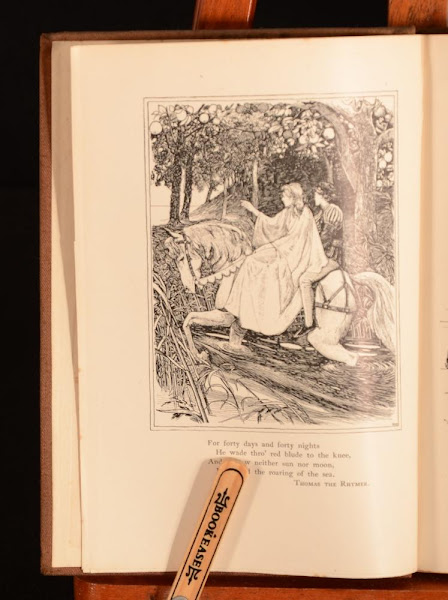
R. Brimley Johnson, ed.: Popular British Ballads (4 vols: 1894)
•

R. Brimley Johnson: Popular British Ballads (1894)
[Purchased: Devonport, Friday, September 11, 2020]:
R. Brimley Johnson, ed. Popular British Ballads: Ancient and Modern. Illustrated by W. Cubitt Cooke. 4 vols. London: J. M. Dent & Co., 1894.
I bought this very pretty set of volumes at Bookmarks secondhand bookshop in Devonport. They lured me in by posting photos of their front window on facebook, together with loud proclamations about how they were open again for business after the second COVID lockdown.
I ask you, as a booklover, what could I do but visit and buy some books from them in a spirit of pure disinterested patriotism?
I guess what's most interesting about this book is the beautiful, reader-friendly layout, and also the very amusing late nineteenth-century illustrations by W. Cubitt Cooke. There are a great number of these - almost as many as there are ballads, in fact:
The first two volumes contain mostly traditional ballads, the last two are reserved for 'named' authors, English, Scottish and Irish (the editor laments not having found any English-language Welsh ballads to include).
I suppose that my interest in this quaint old book stems from a fascination with ballads - both traditional and imitation - in general. I do have quite a number of books on the subject, I've begun to realise:
Thomas Percy. Reliques of Ancient English Poetry. 1765. Ed. Ernest Rhys. 2 vols. Everyman’s Library. London: J. M. Dent & Sons, Ltd. / New York: E. P. Dutton & Co., n.d.
Thomas Percy. Reliques of Ancient English Poetry: Consisting of Old Heroic Ballads, Songs, and Other Pieces of Earlier Poets, together with some few of later date. 1765. Ed. Henry B. Wheatley. 1886. 3 vols. New York: Dover, 1966.
Percy's Reliques can be credited with starting the whole craze. It came at just the right time, when the early Romantic poets were looking for something fresh and new to upset the applecart of polished Augustan verse. The ballad stanza, with its vernacular vigour and driving rhythms, was just what they needed. Wordsworth & Coleridge's Lyrical Ballads (1798) was just one of many tributes to the form.
The next great landmark was undoubtedly Sir Walter Scott's Minstrelsy of the Scottish Border (1802). Like the Reverend Thomas Percy, Scott took great liberties with his material. Not only did he 'correct' and 'improve' traditional ballads as he saw fit, but he also included a number of original compositions of his own in his collection.
Nevertheless, for sheer readability, his must be rated one of the most successful ballad repositories of all time.
Sir Walter Scott, ed. Minstrelsy of the Scottish Border: Consisting of Historical and Romantic Ballads. 1802-3. Ed. Alex. Murray. London: Alex. Murray & Son, 1869.
Which brings us to the greatest collection of all: Frances James Child's English and Scottish Popular Ballads. Child, an American scholar and antiquarian, had imbibed his approach to folklore from pioneering German collectors such as Johann Gottfried Herder and Jakob and Wilhelm Grimm.
His major innovation was to reprint all the significant texts he could find of each of the traditional ballads, instead of combining them into some 'ideal' form. The result can be somewhat cumbrous to read, but is hugely informative and interesting.
His five huge volumes (available in an inexpensive reprint from Dover Books) remain an intellectual landmark impossible to supersede - though it has, of course, been supplemented since from many sources.
Francis James Child, ed. The English and Scottish Popular Ballads. 5 vols. 1882-84, 1885-86, 1888-89, 1890-92, 1894-98, 1906. New York: Dover, 1965.
Other great nineteenth-century balladeers include Tennyson, Dante Gabriel Rossetti, William Morris, and Algernon Swinburne:
Algernon Charles Swinburne. Ballads of the English Border. Ed. William A. MacInnes. London: William Heinemann Ltd., 1925.
I've listed below a few of the more interesting specimens from the somewhat mixed bag of balladry which has accreted on my shelves over the years.
Some include musical notations of the tunes as well as the words of the ballads. Some are edited with scholarly rigour, others with more popular abandon. The amazing thing is how seldom they repeat each other. It really is one of the flexible and interesting forms in English poetry - and one whose appeal goes far beyond those who already identify as poetry lovers:
- Percy Dearmer, R. Vaughan Williams & Martin Shaw, ed. The Oxford Book of Carols. 1928. London: Geoffrey Cumberlege / Oxford University Press, 1950.
- Vivian de Sola Pinto & Allan Edwin Rodway, ed. The Common Muse: An Anthology of Popular British Ballad Poetry 15th-20th Century. 1957. Penguin Poets D89. Harmondsworth: Penguin, in association with Chatto and Windus, 1965.
- Albert B. Friedman, ed. The Penguin Book of Folk Ballads of the English-Speaking World. 1956. Harmondsworth: Penguin, 1978.
- Geoffrey Grigson, ed. The Penguin Book of Ballads. 1975. Harmondsworth: Penguin, 1977.
- John Holloway & Joan Black, ed. Later English Broadside Ballads. London: Routledge & Kegan Paul, 1975.
- Stan Hugill, ed. Shanties from the Seven Seas: Shipboard Work-Songs and Songs Used as Work-Songs from the Great Days of Sail. 1961. London & Henley: Routledge & Kegan Paul Ltd., 1979.
- James Kinsley, ed. The Oxford Book of Ballads. 1969. Oxford Paperbacks. Oxford: Oxford University Press, 1982.
- Sir Arthur Quiller-Couch, ed. The Oxford Book of Ballads. 1910. Oxford: The Clarendon Press, 1930.
- James Reeves. The Idiom of the People: English Traditional Verse Edited with an Introduction and Notes from the Manuscripts of Cecil Sharp. London: William Heinemann Ltd., 1958.
- Frederick Woods, ed. The Oxford Book of English Traditional Verse. Oxford: Oxford University Press, 1983.
•
- category - English Poetry (pre-1900): Anthologies & Secondary Literature

















